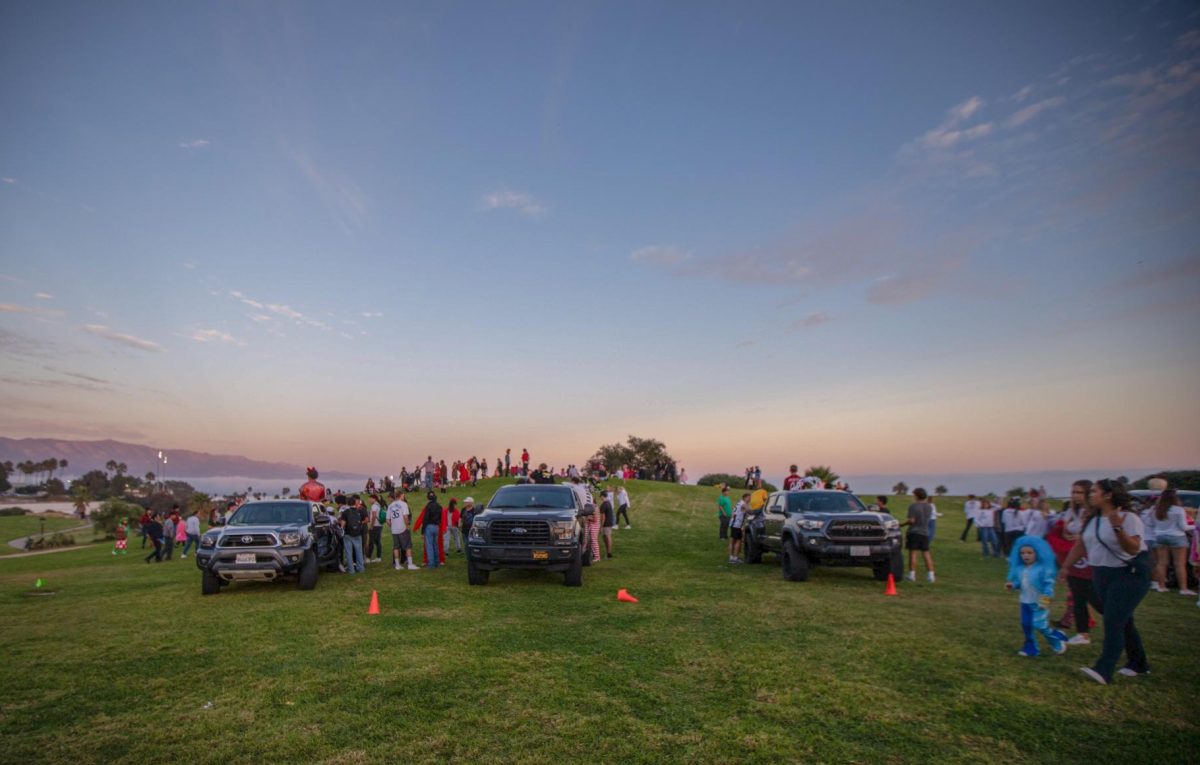Beautiful sun-soaked California girls jiggle past in clingy garb. Smiles flash. Guys greet girls with easy hugs. The weather is perfect, heaven for most 22-year-old males.
But for Afiz Idris, a Muslim living in the non-Muslim world of City College, heaven is a place he awaits.
In a time when the Muslim faith is misunderstood by many Americans, Idris’s dedication may seem foreign. He works hard to stay close to Allah, and Islam offers “the right way to hold my life,” he says. To him, prayers are more important than pursuing pleasures.
At first, everything about Idris seems contradictory. His low voice belies his smallish stature. His loosely fitted jeans and rumpled collar camouflage his Nigerian origins, making him appear to be a typical American youth.
He left Nigeria for the United States “to get a good college education,” but in coming here, he reconnected with his Muslim upbringing. He said he is unwilling to compromise his beliefs for the sake of fitting in.
“Once a person says, ‘That’s just the norm,’ you lose yourself,” Idris says. “If I see something I don’t like, I turn away.”
Idris is familiar with looking away from scenes that are a challenge to his sensibilities. He recalls seeing a dead body on a corner in his native Lagos, Nigeria where he spent his adolescence.
“Everyone drove by,” he says.
Idris said it is difficult sometimes to practice Islam in America.
“I have to squeeze myself tighter, restrain myself,” Idris says. Praying trumps partying and gives him strength to resist the seduction of the American lifestyle, he said.
Marriage allows for the “lawful way of fornication,” he says, and his wife must be Muslim. Having spent half his life in the United States and Canada, Idris said he considers virginity as not absolutely necessary and understands it’s not easy to find in the Anglo world. His father has two wives, but Idris jokes that “one marriage is enough of a headache.”
Idris strengthens his resolve for purity, joining other Muslim students for prayer at the Mosque. His friend, student Omar Elwafaii, is a native Californian whose parents are Syrian and Sudanese.
“I admire that Afiz can do what he puts his mind to,” said Elwafaii. They meet off campus at Islamic society meetings, which are attended mostly by older people. On campus, Elwafaii, bedecked in a turban, greets Idris who is hooded in a gray sweatshirt.
Elwafaii asks, “Where are you praying? Wait for me at the lawn in 20.” It’s not exactly a pickup basketball game, but praying together can build Islamic team spirit.
Idris’s life isn’t all about prayers. On campus, he works as a math tutor. His supervisor, tutor coornidatorBarbara Dunaway, explains that at first, Idris waited for students to ask for help.
“I’d guess he felt students were lazy,” Dunaway said. Now he is always on his feet, circulating, she added.
Linda Miller, a fellow tutor, says that in the lab Idris skims close to temptation, which can be “especially difficult with the way some of the females dress.”
However, she said that he resists temptations and “that takes courage.”
Idris said he often has doubts about non-Muslims, but not always. Miller, who is also a Veterans for Peace activist, says they share some of the same sentiment.
“We agree that we don’t want to be killing Arabs in Iraq,” Miller said. She said she sees Idris at college fairs where banners display their respective beliefs. He is usually reserved, she said, but he comes alive when he is discussing his religion.
Idris relates Ramadan, the ninth month of the Islamic calender, as being “like your Christmas.”
He mulls over which bathroom to use for washing before prayers. Prayers are meaningless without the proper preparation, he says. The challenges mount during the season.
“In an Islamic country, I’d be at the mosque or reading the Qur’an during Ramadan,” Idris says. “I wouldn’t be doing this.” He gestures to his open textbook, displaying designs of buildings he plans to build one day as an architecture major.
At 2 p.m., the sun is past its zenith and it’s time to pray. The low blood sugar from fasting for Ramadan is obvious in Idris tapping his impatient finger.
He calms himself with words about the ritual of prayer.
“When I build the mosques and Islamic schools, I will be benefiting generations of future Muslims,” Idris says.
There is no need to ask will the real Idris stand up; he is already headed out the door. His books scooped up, he looks for fellow Muslims in pursuit of a place to pray. He is answering the call to prayer.
-Maud Huey-Kenyon is a Journalism 271 student.







